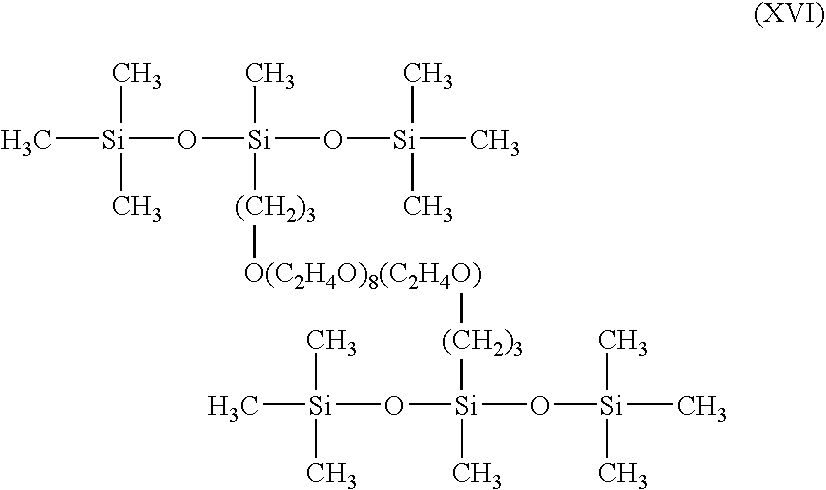Surfactant-based composition and associated methods
a technology of surfactant and composition, applied in the field of surfactant-based composition, can solve the problems of poor hydrolytic stability and poor spreading properties of conventional trisiloxane-based surfactants
- Summary
- Abstract
- Description
- Claims
- Application Information
AI Technical Summary
Benefits of technology
Problems solved by technology
Method used
Image
Examples
example 1
on of Allyl Capped Polyoxyethylene
[0081] Sodium hydride (NaH) is washed with dry hexane three times to remove mineral oil and dried under nitrogen (N2) flow. NaH (4.8 grams, 60 weight percent dispersed in mineral oil) is placed in a three-necked round flask equipped with gas inlet and magnetic stirrer. Dry tetrahydrofuran (THF, 50 milliliters) is charged into the flask. Polyoxyethylene (30 grams, average Mn=600) dissolved in 100 milliliters THF is added within 1 hour. The mixture is stiffed at room temperature for 3 hours. Allyl bromide (14.4 grams) in 30 milliliters THF is added dropwise within 30 minutes. The mixture is stirred overnight. After filtering off solid and evaporating solvent, allyl-capped polyoxyethylene is obtained.
example 2
on of Sample 1
[0082] Heptamethyl trisiloxane (HMTS, 1.11 grams), the allyl-capped polyoxyethylene (1.79 grams, average Mn=600) synthesized in Example 1, and 20 microliters of Pt(0) catalyst are dissolved in 10 milliliters of dry toluene and charged into a 100 milliliters schlenk flask. The mixture is degassed for 3 times and heated to 90 degrees Celsius with magnetic stirring for 2 hours. After cooling to room temperature, the mixture is filtered through diatomite and solvent removed by evaporation, to result in a Gemini surfactant, Sample 1. Sample 1 is straw-colored oil after vacuuming at 90 degrees Celsius for 1 hour.
example 3
on of Sample 2
[0083] Heptamethyl methylene disilane (HMMDS), the allyl-capped polyoxyethylene (average Mn=600) synthesized in Example 1, and 20 microliters of Pt(0) catalyst are dissolved in 10 milliliters of dry toluene and charged into a 100 milliliters schlenk flask. The mixture is degassed for 3 times and heated to 90 degrees Celsius with magnetic stirring for 2 hours. After cooling to room temperature, the mixture is filtered through diatomite and solvent removed by evaporation, to result in a Gemini surfactant, Sample 2. Sample 2 is a straw colored oil after vacuuming at 90 degrees Celsius for 1 hour.
PUM
| Property | Measurement | Unit |
|---|---|---|
| Percent by mass | aaaaa | aaaaa |
| Volume | aaaaa | aaaaa |
| Acidity | aaaaa | aaaaa |
Abstract
Description
Claims
Application Information
 Login to View More
Login to View More - Generate Ideas
- Intellectual Property
- Life Sciences
- Materials
- Tech Scout
- Unparalleled Data Quality
- Higher Quality Content
- 60% Fewer Hallucinations
Browse by: Latest US Patents, China's latest patents, Technical Efficacy Thesaurus, Application Domain, Technology Topic, Popular Technical Reports.
© 2025 PatSnap. All rights reserved.Legal|Privacy policy|Modern Slavery Act Transparency Statement|Sitemap|About US| Contact US: help@patsnap.com


